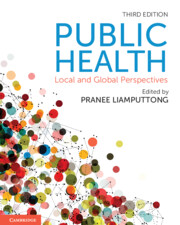94 results
Frontmatter
-
- Book:
- Public Health
- Published online:
- 25 July 2022
- Print publication:
- 10 August 2022, pp i-iv
-
- Chapter
- Export citation
Contributors
-
- Book:
- Public Health
- Published online:
- 25 July 2022
- Print publication:
- 10 August 2022, pp xvii-xxi
-
- Chapter
- Export citation
Part 1 - Historical and theoretical perspectives
-
- Book:
- Public Health
- Published online:
- 25 July 2022
- Print publication:
- 10 August 2022, pp 23-24
-
- Chapter
- Export citation
Part 3 - Public health and research
-
- Book:
- Public Health
- Published online:
- 25 July 2022
- Print publication:
- 10 August 2022, pp 217-218
-
- Chapter
- Export citation
Acknowledgements
-
- Book:
- Public Health
- Published online:
- 25 July 2022
- Print publication:
- 10 August 2022, pp xxii-xxiv
-
- Chapter
- Export citation
Part 2 - Determinants of health
-
- Book:
- Public Health
- Published online:
- 25 July 2022
- Print publication:
- 10 August 2022, pp 127-128
-
- Chapter
- Export citation
12 - Qualitative research methodology and evidence-based practice in public health
- from Part 3 - Public health and research
-
-
- Book:
- Public Health
- Published online:
- 25 July 2022
- Print publication:
- 10 August 2022, pp 219-235
-
- Chapter
- Export citation
Preface
-
- Book:
- Public Health
- Published online:
- 25 July 2022
- Print publication:
- 10 August 2022, pp xv-xvi
-
- Chapter
- Export citation
1 - Public health: An introduction to local and global contexts
-
-
- Book:
- Public Health
- Published online:
- 25 July 2022
- Print publication:
- 10 August 2022, pp 1-22
-
- Chapter
- Export citation
Index
-
- Book:
- Public Health
- Published online:
- 25 July 2022
- Print publication:
- 10 August 2022, pp 424-432
-
- Chapter
- Export citation
Contents
-
- Book:
- Public Health
- Published online:
- 25 July 2022
- Print publication:
- 10 August 2022, pp vii-xiv
-
- Chapter
- Export citation
Dedication
-
- Book:
- Public Health
- Published online:
- 25 July 2022
- Print publication:
- 10 August 2022, pp v-vi
-
- Chapter
- Export citation
Part 4 - Public health issues and special populations
-
- Book:
- Public Health
- Published online:
- 25 July 2022
- Print publication:
- 10 August 2022, pp 277-278
-
- Chapter
- Export citation

Public Health
- Local and Global Perspectives
-
- Published online:
- 25 July 2022
- Print publication:
- 10 August 2022
-
- Textbook
- Export citation
1 - Public health: An introduction to local and global contexts
-
- Book:
- Public Health
- Published online:
- 22 June 2019
- Print publication:
- 16 May 2019, pp 1-22
-
- Chapter
- Export citation
10 - Human rights, social justice and public health
- from Part 2 - Determinants of health
-
- Book:
- Public Health
- Published online:
- 22 June 2019
- Print publication:
- 16 May 2019, pp 178-196
-
- Chapter
- Export citation
Part 3 - Public health and research
-
- Book:
- Public Health
- Published online:
- 22 June 2019
- Print publication:
- 16 May 2019, pp 197-198
-
- Chapter
- Export citation
11 - Qualitative research methodology and evidence-based practice in public health
- from Part 3 - Public health and research
-
- Book:
- Public Health
- Published online:
- 22 June 2019
- Print publication:
- 16 May 2019, pp 199-216
-
- Chapter
- Export citation
1 - Public health: An introduction to local and global contexts
-
-
- Book:
- Public Health
- Published online:
- 22 June 2019
- Print publication:
- 16 May 2019, pp 1-22
-
- Chapter
- Export citation
Contents
-
- Book:
- Public Health
- Published online:
- 22 June 2019
- Print publication:
- 16 May 2019, pp vii-xiv
-
- Chapter
- Export citation



